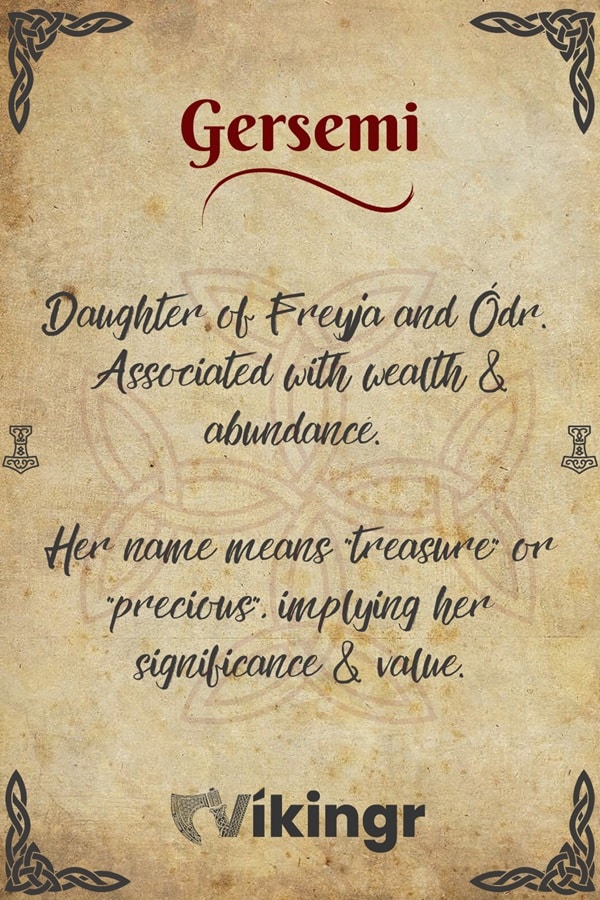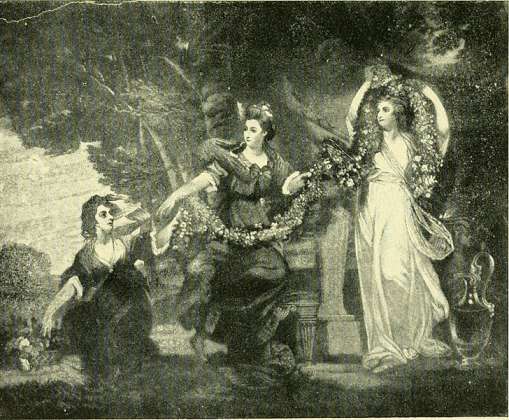Gersemi, and her sister Hnoss, are the daughters of Freyja and Odr. Gersemi is the goddess of adoration, watching over all the handmade and precious little things.
Short Facts about gersemi
| Parents | Freyja and Óðr |
| Partners | None known |
| Siblings | Hnoss |
| Offspring | None known |
| Tribe | Aesir |
| Old Norse name | Gersemi |
| Other names | None |
| The God of | Precious treasures |
| Ass. Animal | None known |

Name and Etymology
Gersemi, derived from the Old Norse, translates to “treasure” or “jewel”. However, her name can also be seen as meaning “somtehing which is treasured”, it doesn’t have to be a literal treasure or jewel. This name undoubtedly underscores her association with wealth and beauty. In poetic expressions, the name has also been used as a kenning for treasures, subtly nodding to her exalted status.
Gersemi Origins
Born to Freyja, the goddess of love, and Óðr, a mysterious god who’s often away, Gersemi inherited her mother’s charm and allure. She has a sister named Hnoss, another symbol of wealth. While not much is detailed about her birth, her very existence symbolizes the immense wealth and beauty of her parents, particularly her mother, Freyja.
Her compelling magnetism, her passion and adoration, and her strong connection with her twin sister Hnoss
Beautiful and unique
Gersemi is the goddess of adoration and beauty. Together with her twin sister Hnoss, they are mysterious and seductive Aesir deities of physical beauty. She and Hnoss are the daughters of Odr and Freyja.
Gersemi is also linked with care, precious valuables – especially small ones, handmade presents, passion and respect. Her name means ‘treasure’ in Old Norse and she’s so beautiful that everything nice-looking is called ‘gersamr’ meaning treasure.
Gersemi and Hnoss share the same abilities; overwhelming beauty and their names identical to treasure. This has led many scholars to assume that she is just another name for Hnoss. Yet, Odr and Freyja had two daughters and not just one. And although they are twins she is slightly different from Hnoss. Her eyes are said to be bluer and she is more energetic than her sister.
Play Fun Norse Quiz
Is this article making you even more curious about Norse gods and goddesses? You can satisfy your curiosity by playing a fun Norse mythology quiz. This way, you can test your knowledge about Norse gods and goddesses, as well as fill in some gaps. Good luck and have fun playing!
Don’t forget to try our other games as well!
In the old texts
Gersemi, along with her twin sister Hnoss, is only mentioned once in the Ynglinga saga, as a daughter of Freyja.
FAQS
Gersemi is the daughter of Freyja and Óðr.
Her name translates to “treasure” or more broadly, something of great value, which is treasured, in Old Norse.
There’s no mention of Gersemi having any offspring in the myths.
While not a major deity, her symbolic importance is profound.
No, she is barely mentioned at all.
Featured Image Credit: George Dunlop Leslie, Public domain, via Wikimedia Commons

